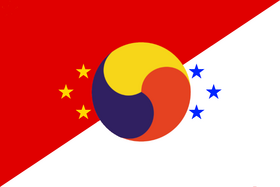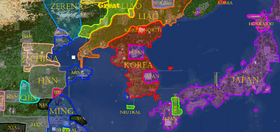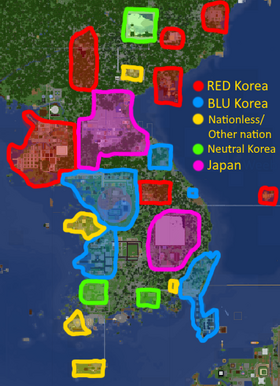People's Republic of Korea: Difference between revisions
>Phi161803GoldenRatio |
>DLRSFluxify m (Undo revision 54499 by Phi161803GoldenRatio (talk)) |
||
| Line 20: | Line 20: | ||
Result: | Result: | ||
Minister of Foreigner's Affair -> nice_pengguin | Minister of Foreigner's Affair -> nice_pengguin<nowiki/> | ||
Minister of Territory -> Rezolent_ | Minister of Territory -> Rezolent_ | ||
| Line 234: | Line 234: | ||
==== Conflicts ==== | ==== Conflicts ==== | ||
* '''1 May - 5 May''' - [[Japan]] acquires Daegu, causing a conflict between Japan's side and on [[North Korea]] and [[Korea]]'s side. Conflict ends with an expansion treaty with Japan. | * '''1 May - 5 May''' - [[Japan]] acquires Daegu, causing a conflict between Japan's side and on [[North Korea]] and [[Korea]]'s side. Conflict ends with an expansion treaty with Japan. | ||
* '''6 May - 7 July '''- | * '''6 May - 7 July '''- Supports Kampuchea. Siam, Vietnam, Britain, and Japan at war with Kampuchea and therefore are in conflict with Korea. Kampuchea disbands and all its former towns join Indochina (formerly Siam and Vietnam). Korea no longer in conflict. | ||
* '''15 August - 16 August''' - Seoul leaves Korea and accepts nation invite from Shimazu. Mayor of Seoul, xSxlty, refuses all communication with Korea. Conflict escalated into a war. | * '''15 August - 16 August''' - Seoul leaves Korea and accepts nation invite from Shimazu. Mayor of Seoul, xSxlty, refuses all communication with Korea. Conflict escalated into a war. | ||
Revision as of 19:00, 30 August 2020
| |||||||||||||||||||||||||||||||||
(Article is not fully finished, feel free to expand it, if something is incorrect please correct it)
The People's Republic of Korea (formerly Dual Republic of Korea), or PRK was created on 5 May 2020 after the leaders of North_Korea and Korea, Ionao and Nalasleafheart, respectively, agreed to unite their nations. The PRK used be split into two sub-nations, but currently functions like one nation. The PRK was formed after a vote was called to rename the nation and to remove the Red and Blu sides of Korea. The citizens of Korea overwhelmingly voted in support for the change.
History (incomplete)
First Era: Unification and Consolidation
United Korea formed shortly after the Japanese Invasion of Korea. In this era, Korea prioritized expanding its towns and re-claiming fallen towns for itself. This era was peaceful, and Korea was not heavily involved in any conflicts
First Minister Election
The election started on 25 May and ended on May 30.
Result:
Minister of Foreigner's Affair -> nice_pengguin
Minister of Territory -> Rezolent_
Minister of Culture -> Phi___
Minister of Army -> Akscoop
Second Era: Collapse of Blu Korea
Nalasleafheart's Departure
The second era begun when Nalasleafheart, leader of Blu Korea, left Seoul, Korea to join Shimazu.
Rapid decline of Seoul
Shortly after Nalasleafheart left, Seoul rapidly lost almost all of its residents, which significantly impacted Korea's population count. As of 13 August 2020, Seoul has still not recovered due to the inactivity of the mayor of the town and his refusing to answer to the government, the city keep only 2 residents inside and does not develop.
Rezolent_'s departure
After Seoul's decline, the past emperor of (South) Korea and prime minister of Blu Korea, Rezolent_ also left.
Government Reformation
Red Korea was still lead by Ionao, but Blu Korea was lead by no-one and had no clear successor. Ionao started a referendum to disband the Red and Blu sides of Korea and to rename the nation, which both citizens of Red and Blu could vote on. The citizens voted overwhelmingly in favor of the referendum and after the voting closed Korea reformed its government. Korea was no longer a Dual Republic.
Korea-Date War
The Korea-Date war began when Date declared war on Korea on 30 July and ended when Korea (conditionally) surrendered to Date on 4 Aug. Date accused Korea of supporting their enemy, Shimazu, and used that as their cases belli. On 30 July, Date and Korea tried to negotiate peace via a peace talk. Both Date and Korean citizens were invited, and the peace talk started when both sides could negotiate. Korea proposed a peace deal first.
Korea's proposed treaty: (might not be accurate)
Korea:
-remove all diplomatic ties to Shimazu
Date:
-non-aggression with Korea
Date rejected Korea's peace deal and proposed a new one.
Date's proposed treaty: (might not be accurate)
Korea:
-remove all diplomatic ties to Shimazu
-allow Date to build a town in Korea
Date:
-non-aggression with Korea
Most of Korea's negotiators rejected the treaty. Korea's objection was that Date's reason for war was to stop Korean involvement in Shimazu. Date said they had more reasons for war.
Date's stated reasons for war:
-Korea is Anti-Japanese
-Korea is part of the Japanese Homeland
-Korea is a close ally of Shimazu
-Date clan needs land for its natural expansion
After Date stated their reasons for war all of Korea's negotiators rejected Date's treaty and left the peace talk.
Korea and Date would go to war.
Battle of Pyongyang
(incomplete)
United Nations involvement in Korea-Date war
(incomplete)
Second Minister Election
The election started on 24 July and ended on 6 August.
Result:
Minister of Territory -> ubadmeme
Minister of Foreigner's affair -> Phi___
Minister of Army -> Akscoop
Minister of Culture -> Computer_x64
Seoul Rebellion
The Seoul Rebellion started on 15 August when the mayor of Seoul, xSxlty, left Korea without notice and accepted the nation invite from Shimazu. Korea's war with Shimazu started on 16 August after a failed attempt to diplomatically resolve the situation, called The Seoul Resolution. The Seoul Resolution failed after Shimazu proposed a treaty to keep Seoul but to promise to not expand into Korea further. Korea rejected Shimazu's proposal and would only accept a proposal if Shimazu would agree give back Seoul. The leader of Shimazu, Qorrin, and the mayor of Seoul, xSxlty, then left the Seoul Resolution and the discussion ended. Korea soon after declared war.
Government (incomplete)
PRK used to be split into two sub-nations, Red Korea and Blu Korea (TF2 reference). Currently the PRK functions as one nation, and more closely resembles Red Korea.
Peoples Republic of Korea
Leader
The leader of Korea, Ionao, works with the ministers to make decisions for the nation.
Prime Minister
The prime minister is picked by the leader.
Ministers
There are four types of ministers, each with their own role in the nation. Ministers are elected democratically by citizens of the nation every three months. Any citizen can run for any minister position.
Current Ministers:
- Minister of Foreigner's Affair, Phi___ : Expansion Party of Korea
- Minister of Territory, ubadmeme : Equalitarist Party of Korea
- Minister of Culture, Computer_x64 : Equalitarist Party of Korea
- Minister of Army, Akscoop : Expansion Party of Korea
Towns (15)
- Kapsan
- Hamhung
- Incheon
- Koksan
- Pyongyang
- canti
- Pyeongchang
- Gwangju
- Kanggye
- Busan
- Yugoasia
- Daejeon
- Jukdo
- Puryong
- Wonsan
Dual Republic of Korea (obsolete)
Red Korea
Red Korea was lead by Ionao. Red Korea administrated the north of Korea.
Towns
- Pyongyang (Capital)
- Pyeongchang
- Kanggye
- <Exodus>
- Wonsan
- Kapsan
- Puryong
- Vladivostook
- Jukdo
- Hamhung
Blu Korea
Blu Korea was lead by Nalasleafheart. Blu Korea administrated the south of Korea
Towns
- Seoul (Capital)
- Daejeon
- Gwangju
- Yeosu
- Dongshae-si
- Ulsan
Military
Korean Common Army
The Korean Common Army (KCA) is the official army of Korea. The leader of the army is the current Minister of Army, Akscoop. It is made up of the combined forces of the Red and Blu army.
Buildings (incomplete)
The building of the nation are mainly linked to a traditional Asian and Korean build, mixed for the north of the peninsula by North Korean style building.
Important Buildings
- Parlement of People's Republic of Korea (Pyongyang)
- Taegeuk roof (Seoul)
- Juche tower (Pyongyang)
- Military Base (Pyongyang)
- Auditorium (Pyongyang)
- Korean Subway (Korea)
- Korean Nether Transit (Korea)
- Ionao's Statue (Kanggye) (built by the original mayor of Kanggye)
- Puryong, Town adapted to the coast (Puryong)
- First Kelp temple (Seoul)
Notable People
- Ionao (Leader of PRK and Leader of Red Korea during DRK)
- Nalasleafheart (Old Leader of BLU Korea during DRK)
- Rezolent_ (Old Prime Minister of BLU Korea during DRK)
- Nice_Pengguin (Prime Minister of PRK and Prime minister of RED Korea during DRK)
Economics
People's Republic of Korea
The PRK follows Equalitarist Communism
Dual Republic of Korea
Red Korea followed Equalitarist Communism who were developed in North Korea.
Blu Korea followed Laissez-faire Capitalism.
Infrastructure (incomplete)
(should list all nether and overworld highways on Korean peninsula, incomplete)
Nether
Overworld
Diplomacy
Opinion of other nations (not a comprehensive list)
(as of 16 August 2020)
Ranked from most friendly relation to least friendly relation.
- Friendly or neutral towards most neighboring nations
- Neutral towards Daegu (Japan owned town in Korea)
- Unfriendly towards Date and Date towns in Korea
- Hostile towards Shimazu, Ishikari, Hokkaido, and the town of Seoul
Conflicts and wars
(also includes shared relations/conflicts/wars between North Korea and Old Korea)
Conflicts
- 1 May - 5 May - Japan acquires Daegu, causing a conflict between Japan's side and on North Korea and Korea's side. Conflict ends with an expansion treaty with Japan.
- 6 May - 7 July - Supports Kampuchea. Siam, Vietnam, Britain, and Japan at war with Kampuchea and therefore are in conflict with Korea. Kampuchea disbands and all its former towns join Indochina (formerly Siam and Vietnam). Korea no longer in conflict.
- 15 August - 16 August - Seoul leaves Korea and accepts nation invite from Shimazu. Mayor of Seoul, xSxlty, refuses all communication with Korea. Conflict escalated into a war.
Wars
- 30 July - 4 Aug - Korea-Date War. Date declares war on Korea. Date says the cause for war is that Korea supports their enemy, Shimazu. As of 7 Aug, Date and Korea are negotiating a peace deal.
- 16 August - Present - Seoul Rebellion. Korea declares war on Shimazu. Korea says Shimazu took Seoul from them and uses that as their reason for war. (casus belli might not be accurate)



